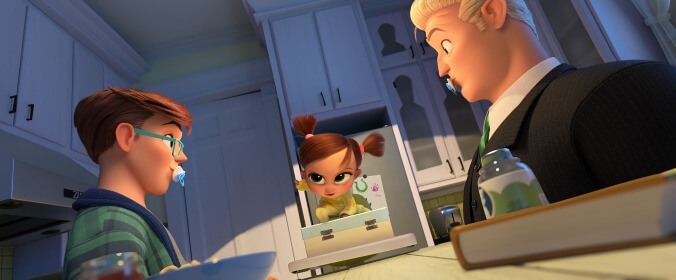Meet the new Boss Baby, pretty much the same as the old Boss Baby
Batty baby-centric sequel The Boss Baby: Family Business rehashes the plot of the 2017 film

If the gender politics of the Boss Baby movies were something even remotely worth caring about, then The Boss Baby: Family Business would have some explaining to do. In this second film in the series, the family crushed under the tiny, tyrannical thumb of the title character in the first movie has drifted apart. Older brother Tim, voiced by James Marsden, has grown into a stay-at-home dad with two daughters of his own. And one-time Boss Baby Ted (Alec Baldwin)—graciously granted a name in the four years and four seasons on Netflix that have transpired since the original—is now an adult mogul whose character design is best described as what Donald Trump looks like in his own head. Ted isn’t much of a presence in his family’s life; he sends gifts at Christmas but is always too busy to appear in person. And with him ensconced in a mansion somewhere, the film is now safe to pass the tiny-business-suit reins over to Tina (Amy Sedaris), Tim’s daughter and another BabyCorp plant.
But rather than send Tina and her precocious older sister, Tabitha (Ariana Greenblatt), on an adventure of their own, the film instead embarks on a gambit of subterfuge and magical formula that will return Tim and Ted to their childhood selves for 48 hours so they can go undercover and expose yet another fiendish plot—this one involving babies programming apps at the behest of Dr. Armstrong (Jeff Goldblum), the principal of Tabitha’s suspiciously cutting-edge academy for brainy youths. Now, none of this is particularly nutty for a Boss Baby movie; the original was based on a slim children’s picture book, so filling in the plot with why-the-fuck-not details is part of the formula of this unlikely franchise. Suffice it to say that the core narrative boils down to a reverse Back To The Future as a de-aged Tim bonds with his daughter, complete with uncomfortable sexual overtones when Tim’s wife Carol (Eva Longoria) takes a shine to his 7-year-old self.
The Boss Baby: Family Business has a few thematic through lines. First, it has to get embattled brothers Tim and Ted to reconnect. Fair enough—that was the thrust of the first movie, and if they’re recycling the plot, might as well recycle the emotional beats as well. Then there’s Tim’s fear that Tabitha is growing up too fast, and leaving him behind. Presumably, this is one for the parents in the audience, or perhaps a way to try to get kids to understand where mom and dad are coming from when they get misty-eyed on the first day of school. But Tim’s concern as a dad would be more believable if the movie followed through on a promising early theme of how much academic pressure is appropriate to put on a brilliant kid like Tabitha—or, for that matter, if the film integrated her more into the caper plot. Little Tina is even more sidelined, and watches much of the action from her playpen like Princess Leia in the control room of a Star Wars movie. But why write the girls as distinct characters and not just projections of their father’s insecurities when you can make them sing?
Again, it’s nothing to get worked up about, in part because this Boss Baby moves too quickly to inspire thought about much of anything. Compared to the first film, Family Business moves along at a swift and stimulating clip, with fewer diversions into world-building and hallucinatory internal logic. The movie assumes you’ve seen the original, to the point where one wonders how the 6-year-olds in the audience could possibly remember the detail that sucking on a pacifier is how a grown-up communes with the cosmic consciousness of BabyCorp. Much of the humor in the film will similarly go over younger viewers’ heads: Occasionally, the script tiptoes towards commentary on helicopter parenting and the digital generation gap, but like everything else about this movie, none of that sticks.
The thing that makes The Boss Baby: Family Business somewhat redeemable is its animation, which switches from uninspired 3-D to stylized 2-D whenever Tim imagines himself and his family going on adventures. These are presented in director Tom McGrath’s midcentury-inspired style, whose expressive line work aspires towards—and sometimes approaches—the heights of Fantasia. It would be nice if there were more ebullient flights of animated fancy in this film, and less warmed-over exposition and manic swirl. You’re already building an internal architecture more complicated than some religions, so why not follow your more abstract artistic impulses? As it is, Family Business feels like trying to eat lunch in a room full of screaming toddlers who keep slapping the sandwich out of your hands.